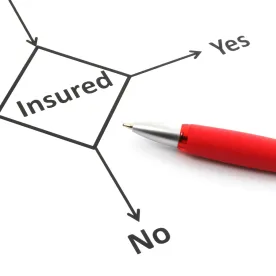In response to the COVID-19 pandemic, governments have declared states of emergency and ordered or recommended a variety of containment measures, including restrictions on public gatherings and, in some circumstances, either restricted hours or mandatory closures for certain businesses. Many businesses are already experiencing disruptions to their normal operations. Because governmental response to the pandemic remains fluid, businesses are uncertain about how long these disruptions may last and about the potential financial impact, including whether their existing insurance policies provide coverage for pandemic-related losses. This Legal Update focuses on types of business insurance coverage that potentially provides coverage for business interruptions.
The coverage provided by different insurers can vary significantly and, therefore, it is critical that businesses read their policies. In general, many businesses have a policy which provides commercial property coverage. This coverage may contain separate forms for business income coverage, civil authority coverage, or communicable disease business income coverage. This Legal Update will address the potential application of each of these coverages, in turn.
A standard business income coverage form provides coverage “for the actual loss of Business Income you sustain due to the necessary ‘suspension’ of your ‘operations’ during the ‘period of restoration.’” Generally, the suspension must be caused by “direct physical loss of or damage to property” at the business. The loss or damage must also be caused by a “covered cause of loss.” For example, a policy may exclude coverage for loss or damage that is caused by flooding or an earthquake.
A typical scenario involving suspension of operations because of “direct physical loss of or damage to the property” is a business closing due to fire damage. Where business operations are suspended because of a pandemic, such as COVID-19, no direct physical loss or damage is necessarily apparent. However, the law is unsettled as to whether the direct physical loss or damage must be observable to trigger coverage.
Businesses also need to know the applicable exclusions to their coverage. Some policies attach an endorsement which specifically excludes loss or damage “caused by or resulting from any virus, bacterium, or other microorganism.” This exclusion may preclude business income coverage because COVID-19 is a virus.
Some businesses may have policies which include specialized business income coverages, such as civil authority coverage or communicable disease business income coverage.
Civil authority coverage typically applies where a government has prohibited access to a business because of damage and resulting dangerous physical conditions elsewhere in the surrounding area. Depending on the policy, the coverage may be limited to businesses located no more than a certain distance from the damage and the resulting dangerous physical conditions. Additionally, coverage may be limited to a short period of time after the government first prohibits access. Currently, it is uncertain when governments will begin to relax or cease pandemic-related containment measures, meaning that even if it is applicable, civil authority coverage is unlikely to extend throughout the duration of the pandemic.
Depending on the policy, communicable disease business income coverage may not require “direct physical loss of or damage to property.” However, this coverage is typically contingent on three separate requirements. First, the loss must result from a temporary shutdown or suspension of business operations. This requirement may preclude coverage for businesses that are affected only by restrictions on their activities and have not experienced a total closure. Second, the shutdown or suspension must be “as ordered” by a local, state, or federal authority. This requirement may preclude coverage for businesses that have voluntarily closed or restricted their operations in the absence of a mandatory order. Third, the shutdown or suspension must be “due to an outbreak” of communicable disease “at the insured premises.” This requirement may preclude coverage for businesses affected by mandatory, ordered closures, but whose premises have not been identified as the site of an outbreak of COVID-19. Business response to the pandemic has varied widely, meaning that no single coverage assessment will fit all situations.
Businesses should keep in mind that they remain bound by certain duties prescribed in their policies, including the duty to provide timely notice and to cooperate with their insurer’s fact-gathering and investigation process. Additionally, businesses should maintain good records carefully identifying and documenting the specific business income lost due to pandemic-related shutdown or suspension of their operations. Well-maintained historical records demonstrating prior revenues may be useful in documenting the magnitude of the loss. As they adapt to restrictions or find new income opportunities, businesses should also document their loss mitigation efforts.





 />i
/>i
